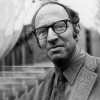Thomas Kuhn

Thomas Kuhn
Thomas Samuel Kuhnwas an American physicist, historian, and philosopher of science whose controversial 1962 book The Structure of Scientific Revolutions was influential in both academic and popular circles, introducing the term "paradigm shift", which has since become an English-language idiom...
NationalityAmerican
ProfessionPhilosopher
Date of Birth18 July 1922
CountryUnited States of America